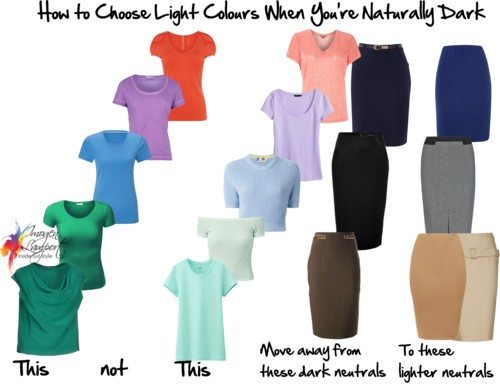Have you written an article yet on colour coordinating for us deep dominant folk especially for summer style?
So you have naturally deeper/darker colouring, but in summer you don’t want to be wearing all those dark winter colours, so how do you choose the lighter colours that will work best for you?
Firstly consider your eye colour – if you look into your eyes (like in this post about eye enhancers) you may find lighter colours as well as darker colours contained in them. If you match these lighter shades this will often be great lighter colours to wear in summer.
Then, each palette has a combination of lighter and darker colours. If you’re naturally very deep, your lighter shades won’t be pastels, but they may be a lighter jewel tone, rather than a deep heavy one.

Look for the medium to lighter colours that suit you from your palette, or if you don’t have a colour palette (though they are a brilliant tool for creating a cohesive and flattering wardrobe and you can get one doing my 7 Steps to Style program) then look for medium colours rather than the really light ones.
If you have very cool colouring you will find that icy colours are a great summer alternative to your normal deeper colours, but just make sure, whichever colours you wear in summer, that you work with your natural contrast levels to make the outfit harmonise with you.














Cool! Look forward to repeating EYS in the summer.
As a dark winter with medium contrast, I rely heavily on white tops in the summer with lighter (grey, tan, etc.) bottoms. If I wear a darker bottom, I break it up with a medium contrast vest or scarf.
Thank you so much for this Imogen – what a star you are. Anne
Wonderful tips! I have basically cool coloring (Winter) not extremely dark but never look good in pastels. I will take your advice and look for the more light/medium tones to avoid a washed out look.
Do you a post on how people with light coloring can wear dark colors in fall/winter?
Thanks!
Sherry – I’d just wear my lighter colours with some darker (but not really dark colours) – have a look at the information on contrast